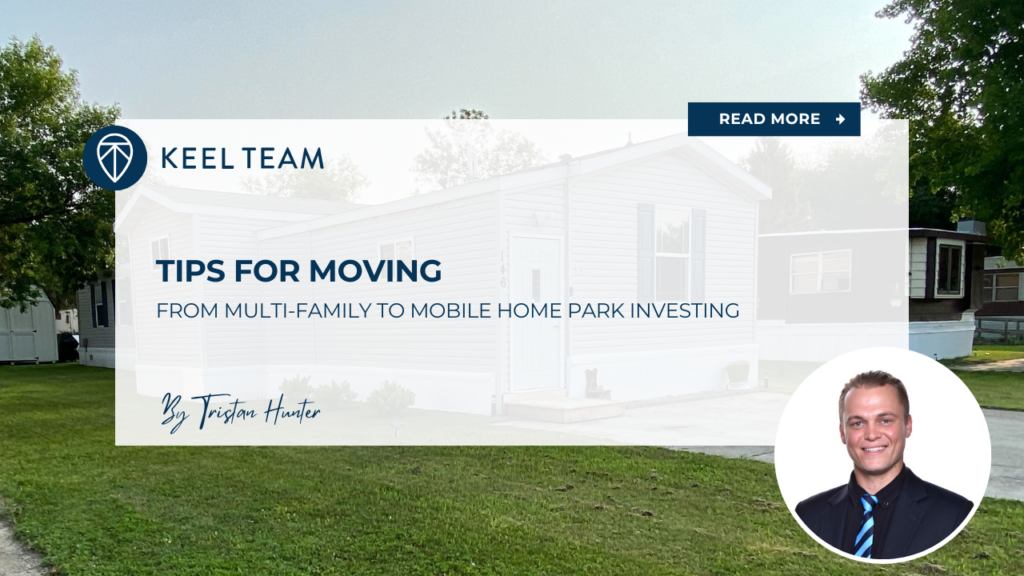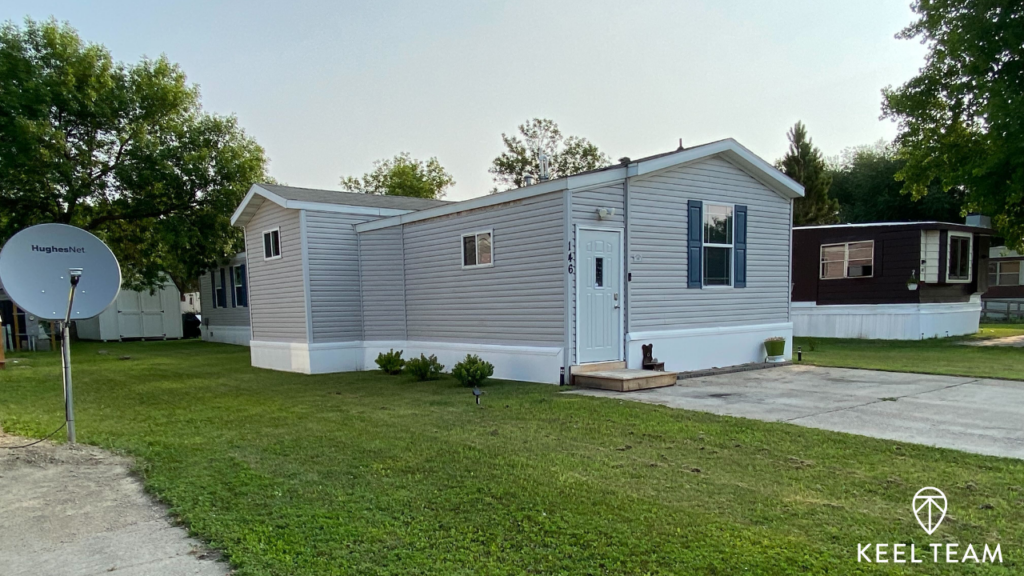Tips for Moving from Multifamily to Mobile Home Park Investing
-
 Tristan Hunter - Investor Relations
Tristan Hunter - Investor Relations

Many investors with experience in multifamily properties are now exploring mobile home parks as a new investment opportunity. Mobile home park investing typically offers unique advantages, but it might come with a different set of challenges. If you’re a multifamily investor considering a transition into mobile home parks, understanding these differences can help you make a smoother transition. Here, we’ll cover essential tips to help multifamily investors dive into this new niche, including insights on management, financing, tenant dynamics, and how to leverage your existing skills.
1. Understanding Key Differences in Management
Managing a mobile home park differs from managing a multifamily property in several ways. In multifamily properties, you’re often responsible for the entire building structure, including maintenance, repairs, and unit turnovers. However, mobile home park management focuses more on managing the land, while the mobile homes themselves may belong to individual tenants.
In mobile home parks, your primary responsibility usually involves maintaining the infrastructure—like roads, utilities, and common areas. This can mean fewer ongoing repairs inside the homes, which some investors find appealing. Additionally, because tenants often own their homes, turnover tends to be lower, as moving a mobile home can be costly. However, tenant retention strategies, such as improving amenities and maintaining good infrastructure, remain important.
Tip: Embrace a community-first approach in mobile home park management. Since tenants typically stay longer, focusing on creating a well-kept and welcoming environment can boost retention and satisfaction.
2. Differences in Financing and Acquisition
Financing mobile home parks can be different from financing multifamily properties. Traditional banks are usually more familiar with multifamily loans, while mobile home parks might require alternative financing sources. Some investors use seller financing, which can be beneficial when purchasing mobile home parks from long-time mom-and-pop owners who prefer a gradual exit.
Additionally, mobile home park deals may involve different terms and interest rates compared to multifamily properties. For example, mobile home park loans might come with shorter loan terms or higher interest rates, depending on the property’s stability and location.
Tip: Explore a variety of financing options, including seller financing, regional banks, and even private investors. Connecting with lenders experienced in mobile home parks can help you secure favorable terms.
Download our FREE eBook on the Top 20 things to know BEFORE investing in mobile home parks!
3. Navigating Tenant Dynamics and Relationships
Tenant relationships in mobile home parks are unique because residents often own their homes and lease the land. This can create a sense of pride in ownership, as tenants have a personal stake in the property. However, you’ll still need to manage tenant relationships effectively, addressing any issues that may arise regarding land upkeep or shared amenities.
Understanding that tenants are homeowners can change the approach to tenant relations. Mobile home park tenants may expect a higher level of autonomy and respect for their personal space. Balancing this with maintaining the property’s overall standards requires clear communication and a fair approach.
Tip: Approach tenant relations with a collaborative mindset. Open communication and regular check-ins can create a positive experience for both tenants and management, potentially enhancing community satisfaction and reducing turnover.
4. Leveraging Your Multifamily Skills in Mobile Home Park Investing
Multifamily investors bring valuable skills to mobile home park investing. Experience with property management, financial analysis, and tenant relations can all play a role in successful mobile home park management. Your understanding of cash flow, expense management, and investment strategy transfers well into the mobile home park niche.
Additionally, your ability to assess properties, negotiate deals, and handle financing complexities will be an asset. Many of the due diligence processes, such as evaluating location, occupancy rates, and property condition, apply to mobile home parks just as they do in multifamily.
Tip: Use your multifamily background to streamline your mobile home park operations. By applying your property management expertise, you can develop efficient systems for mobile home park operations, saving time and resources.
5. Focusing on Infrastructure and Capital Expenditures
In multifamily properties, you often focus on the building’s structure, like roof repairs, plumbing, and HVAC systems. In a mobile home park, infrastructure takes center stage. Roads, utilities, water lines, and electrical systems are essential areas that require regular attention.
Because tenants often own the homes themselves, you may encounter less frequent requests for interior repairs. However, infrastructure investments can significantly impact tenant satisfaction and the long-term value of the mobile home park. Keeping common areas in good shape, addressing any water or electrical system needs, and maintaining smooth roads all contribute to a positive living experience for tenants.
Tip: Prioritize capital expenditures that improve the trailer park’s infrastructure. A well-maintained infrastructure typically attracts tenants and supports the long-term stability of your mobile home park investment.
6. Adapting to Different Market Dynamics
The market for mobile home parks can differ from multifamily properties. Demand for mobile home parks often remains strong in areas with affordable housing shortages, as mobile homes provide an accessible option for many families. The demographics of mobile home park tenants can also vary, with residents including retirees, low-income families, and individuals seeking cost-effective living.
When assessing a market for mobile home park investment, consider factors like local housing costs, median income levels, and regional population trends. Areas with a high demand for affordable housing and limited new construction may offer particularly good opportunities for mobile home park investors.
Tip: Research local market trends that affect mobile home parks specifically, such as housing demand and income levels. This market analysis can guide your decision-making process and help you identify promising investment locations.

7. Preparing for Different Regulations and Zoning Requirements
Zoning regulations for mobile home parks can vary widely depending on location. Some areas have restrictive zoning that limits the availability of new mobile home parks, while others may have more favorable policies. Additionally, compliance with state and local regulations for utilities, safety standards, and environmental codes is crucial.
Multifamily investors are often familiar with property regulations, but mobile home parks may come with additional requirements. Understanding these unique rules will help you avoid potential issues and ensure your mobile home park operates smoothly.
Tip: Familiarize yourself with local zoning laws and regulatory requirements for mobile home parks. Building relationships with local authorities can also streamline the compliance process.
8. Building a Long-Term Investment Strategy
Mobile home parks can serve as a long-term investment, offering steady cash flow and appreciation potential. Because tenants often own their homes and stay longer, mobile home parks can experience lower turnover, which may lead to consistent income. However, building a successful mobile home park investment strategy requires patience and a focus on property improvements that add value over time.
Experienced multifamily investors understand the importance of planning for the future, and this is just as vital in mobile home parks. Developing a strategy that includes gradual improvements, community development, and tenant retention can support the long-term growth of your mobile home park investment.
Tip: Plan for gradual property enhancements to boost the long-term value of your mobile home park. This long-term focus can provide a steady return potential and help you build equity over time.
Final Thoughts
Transitioning from multifamily to mobile home park investing requires adaptability, but it also brings rewarding opportunities. By understanding the key differences in management, financing, tenant dynamics, and market trends, you can likely make a smooth transition into this niche asset class. Use your multifamily experience to your advantage, and approach mobile home park investing with a community-focused mindset to create a potentially successful and lasting investment.
With these tips, you can be prepared to explore mobile home parks as a viable addition to your real estate portfolio. Happy investing!
Are you looking for MORE information? Book a 1-on-1 consultation with Andrew Keel to discuss:
- A mobile home park deal review
- Due diligence questions
- How to raise capital from investors
- Mistakes to avoid, and more!
Disclaimer:
The information provided is for informational purposes only and is not investment advice or a guarantee of any kind. We do not guarantee profitability. Make investment decisions based on your own research and consult registered financial and legal professionals. We are not registered financial or legal professionals and do not provide personalized investment recommendations.

Tristan Hunter - Investor Relations
View The Previous or Next Post
Subscribe Below 👇





